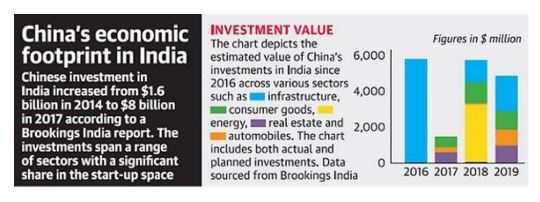UPSC Articles
Government approval mandatory for FDI from neighbouring countries
Part of: GS Prelims and GS-II – International Relations & GS-III – Investment
In News:
- In order to restrict Chinese investments, prior government approval has been made mandatory for foreign direct investments (FDI) from countries which share a land border with India.
Key takeaways:
- Revised FDI policy has stated that entities from countries which share a land border with India will now be permitted to invest only under approval route.
- Previously, only investments from Pakistan and Bangladesh faced such restrictions.
- The revised FDI policy is aimed at preventing opportunistic takeovers/acquisitions of Indian companies due to the current COVID-19 pandemic.
- The rules shall apply to fresh as well as existing FDI.
- Transfer of ownership of any existing or future FDI where the direct or indirect beneficiary is from these countries will also require government approval.
- This restriction will also apply if the beneficial owner of the investment is an entity situated in or a citizen of such countries.
Important value additions:
India’s FDI policy
- A foreign direct investment (FDI) is an investment in the form of a controlling ownership in a business in one country by an entity based in another country.
- India’s FDI policy allows foreign investment in certain sectors under the automatic route.
- 100% FDI is permitted under the automatic route in manufacturing, oil and gas, greenfield airports, construction, railway infrastructure etc.
- In other sectors, FDI is allowed under the automatic route upto a certain threshold, say 26% or 49%.
- Such conditions apply to defence, broadcast and print media, aviation and other sectors.
- There is also a list of prohibited sectors, such as lottery, cigarettes, atomic energy where FDI is not permitted.
India’s neighbouring countries
- India shares a land border with:
- China
- Pakistan
- Bangladesh
- Nepal
- Myanmar
- Bhutan
- Afghanistan

Government approval mandatory for FDI from neighbouring countries
Image Source – Click here











